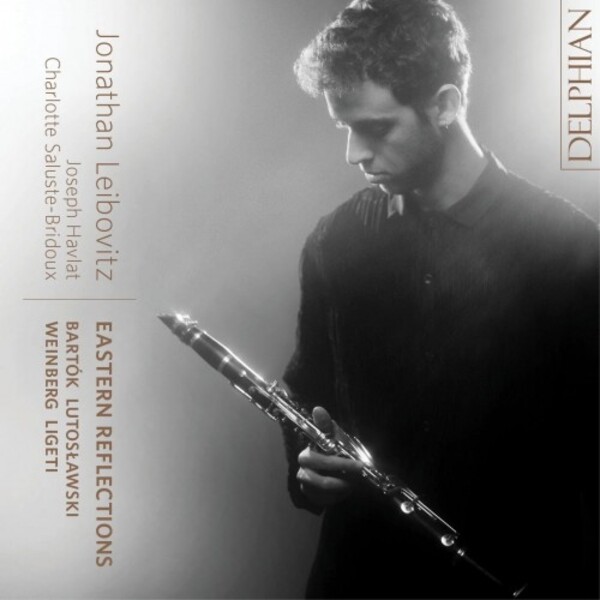Eastern Reflections: Bartók, Lutosławski, Weinberg, Ligeti (Jonathan Leibovitz)
View record and artist detailsRecord and Artist Details
Genre:
Chamber
Label: Delphian
Magazine Review Date: AW2024
Media Format: CD or Download
Media Runtime: 57
Mastering:
DDD
Catalogue Number: DCD34319

Tracks:
| Composition | Artist Credit |
|---|---|
| Contrasts |
Béla Bartók, Composer
Charlotte Saluste-Bridoux, Violin Jonathan Leibovitz, Clarinet Joseph Havlat, Piano |
| Ballade and Dance |
György Ligeti, Composer
Charlotte Saluste-Bridoux, Violin Jonathan Leibovitz, Clarinet |
| (5) Arany Songs |
György Ligeti, Composer
Jonathan Leibovitz, Clarinet Joseph Havlat, Piano |
| Dance Preludes |
Witold Lutoslawski, Composer
Jonathan Leibovitz, Clarinet Joseph Havlat, Piano |
| (24) Preludes, Movement: A flat |
Dmitri Shostakovich, Composer
Jonathan Leibovitz, Clarinet Joseph Havlat, Piano |
| Sonata for Clarinet and Piano |
Mieczyslaw Weinberg, Composer
Jonathan Leibovitz, Clarinet Joseph Havlat, Piano |
Author: Aleksander Laskowski
The works presented on this album were composed in Eastern (many there would now prefer the term Central) Europe between 1932 and 1955, in dark times of war and oppression. The ‘Eastern Reflections’ offer a journey from late Bartók to early Lutosławski.
Bartók’s Contrasts for violin, clarinet and piano was commissioned by Benny Goodman. Leibovitz, Havlat and Saluste-Bridoux are more classical in their approach than is Goodman himself in his 1940 recording with Joseph Szigeti. And they go in exactly the opposite direction to the folk-orientated whimsy of Patricia Kopatchinskaja and Reto Bieri on their ‘Take 3’ album (Alpha, 3/24).
Witold Lutosławski composed his Dance Preludes in 1955, when still searching for his idiosyncratic style in the face of a Stalinist aesthetic imposed on Polish culture, which demanded folk tunes as the point of departure. Lutosławski reluctantly acknowledged the popularity of the piece, whose orchestrated version he recorded with Eduard Brunner in 1987. Leibovitz has a brighter sound and is more energetic, almost to the point of rushing, making the music sound more urgent and contemporary.
Weinberg’s Sonata for clarinet and piano was composed in 1945, when the memories of the pre-war Warsaw of his youth were still fresh in the composer’s mind – Weinberg as a child helped his father in a Yiddish theatre, so klezmer was a native musical tongue, which is clearly audible in this piece. I appreciate the elegance with which Leibovitz meanders between the klezmer vernacular and the classical: it helps bring out the nostalgia that permeates this moving piece. Leibovitz’s interpretation is a valuable addition to the already impressive list of recordings of the Sonata.
Ligeti’s folk-themed Ballad and Dance, a student work from 1950, was originally written for two violins. Here it is performed on violin and clarinet and is a perfect vehicle for virtuoso display. ‘A bujdosó’ is a transcription of a beautifully lyrical song that the young Ligeti wrote in 1952 to a poem by János Arany, often described as ‘the Hungarian Shakespeare’. Leibovitz finds an ideally doleful clarinet tone for this ballad. The ‘Eastern Reflections’ end with a transcription of a Shostakovich piano Prelude arranged for clarinet and piano.
This album is the latest instalment in a collaboration between Delphian and the Young Classical Artists Trust. With informative booklet notes from Daniel Elphick and superb sound quality, it is a very fine debut.
Discover the world's largest classical music catalogue with Presto Music.

Gramophone Digital Club
- Digital Edition
- Digital Archive
- Reviews Database
- Full website access
From £8.75 / month
Subscribe
Gramophone Full Club
- Print Edition
- Digital Edition
- Digital Archive
- Reviews Database
- Full website access
From £11.00 / month
Subscribe
If you are a library, university or other organisation that would be interested in an institutional subscription to Gramophone please click here for further information.




